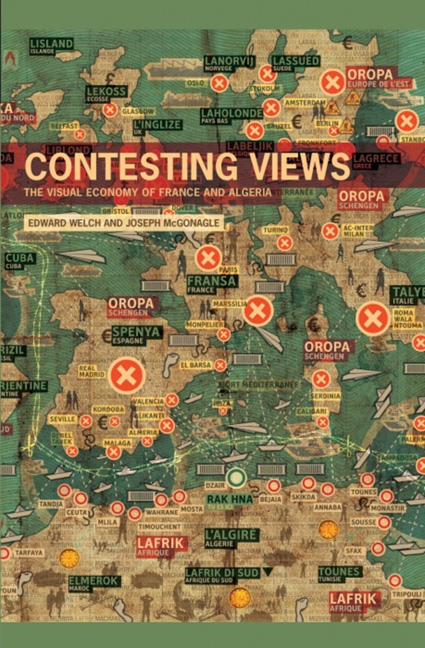Book contents
- Frontmatter
- Contents
- List of Illustrations
- Acknowledgements
- Introduction: Visualising the Franco-Algerian Relationship
- I Algerian Pasts in the French Public Sphere
- II Mapping Franco-Algerian Borders in Contemporary Visual Culture
- 4 War Child: Memory, Childhood and Algerian Pasts in Recent French Film
- 5 Bridging the Gap: Representations of the Mediterranean Sea
- 6 A Sense of Place: Envisioning Post-Colonial Space in France and Algeria
- Conclusion
- Notes
- Bibliography
- Index
6 - A Sense of Place: Envisioning Post-Colonial Space in France and Algeria
from II - Mapping Franco-Algerian Borders in Contemporary Visual Culture
- Frontmatter
- Contents
- List of Illustrations
- Acknowledgements
- Introduction: Visualising the Franco-Algerian Relationship
- I Algerian Pasts in the French Public Sphere
- II Mapping Franco-Algerian Borders in Contemporary Visual Culture
- 4 War Child: Memory, Childhood and Algerian Pasts in Recent French Film
- 5 Bridging the Gap: Representations of the Mediterranean Sea
- 6 A Sense of Place: Envisioning Post-Colonial Space in France and Algeria
- Conclusion
- Notes
- Bibliography
- Index
Summary
Space and the Post-colonial
The previous chapter foregrounded the space of the Mediterranean and its role as a theatre for depicting and investigating the relationship between France and Algeria. We explored how it interferes with and inflects the trajectories of people on both its French and Algerian shores whose lives are defined in some way by moving between the two countries; or, indeed, by the desire or inability to do so. The Mediterranean is both a space to be negotiated and a horizon beyond which lie lands at once real and fantasised. Our aim in this final chapter is to examine how France and Algeria themselves are envisioned in the contemporary period, and, in particular, how they are portrayed as post-colonial countries. We have considered already, in Chapter 1, how an understanding of colonial Algeria is sustained in the present through visual culture. Our focus here is on how the two independent, sovereign states which emerged out of the Évian Agreements of March 1962, each attempting to forge their own way following decolonisation, are perceived and portrayed visually in relation to each other, and what spaces are privileged as locations for staging their relationship on both sides of the Mediterranean. Where do journeys between the two begin and end? What spaces and places are bridged as a result? What points of comparison, contact or opposition are established between France and Algeria through the depiction of space, and what sense of each place do we acquire as a result? How do the circulation of individuals and their movement between and across the spaces of France and Algeria – whether as characters in films or travellers with cameras – open up perspectives on each territory and shape our understanding of them?
- Type
- Chapter
- Information
- Contesting ViewsThe Visual Economy of France and Algeria, pp. 145 - 179Publisher: Liverpool University PressPrint publication year: 2013



